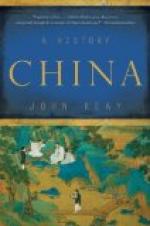The next requirement for the carrying on of the administration was the unification of weights and measures and, a surprising thing to us, of the gauge of the tracks for wagons. In the various feudal states there had been different weights and measures in use, and this had led to great difficulties in the centralization of the collection of taxes. The centre of administration, that is to say the new capital of Ch’in, had grown through the transfer of nobles and through the enormous size of the administrative staff into a thickly populated city with very large requirements of food. The fields of the former state of Ch’in alone could not feed the city; and the grain supplied in payment of taxation had to be brought in from far around, partly by cart. The only roads then existing consisted of deep cart-tracks. If the axles were not of the same length for all carts, the roads were simply unusable for many of them. Accordingly a fixed length was laid down for axles. The advocates of all these reforms were also their beneficiaries, the merchants.
The first principle of the Legalist school, a principle which had been applied in Ch’in and which was to be extended to the whole realm, was that of the training of the population in discipline and obedience, so that it should become a convenient tool in the hands of the officials. This requirement was best met by a people composed as far as possible only of industrious, uneducated, and tax-paying peasants. Scholars and philosophers were not wanted, in so far as they were not directly engaged in work commissioned by the state. The Confucianist writings came under special attack because they kept alive the memory of the old feudal conditions, preaching the ethic of the old feudal class which had just been destroyed and must not be allowed to rise again if the state was not to suffer fresh dissolution or if the central administration was not to be weakened. In 213 B.C. there took place the great holocaust of books which destroyed the Confucianist writings with the exception of one copy of each work for the State Library. Books on practical subjects were not affected. In the fighting at the end of the Ch’in dynasty the State Library was burnt down, so that many of the old works have only come down to us in an imperfect state and with doubtful accuracy. The real loss arose, however, from the fact that the new generation was little interested in the Confucianist literature, so that when, fifty years later, the effort was made to restore some texts from the oral tradition, there no longer existed any scholars who really knew them by heart, as had been customary in the past.




